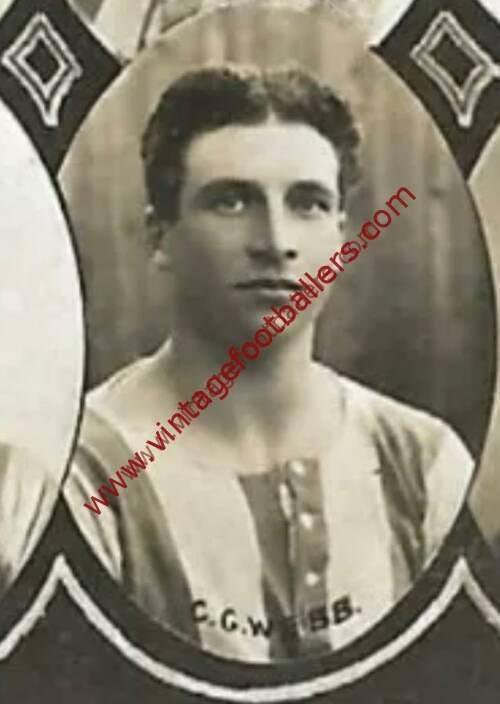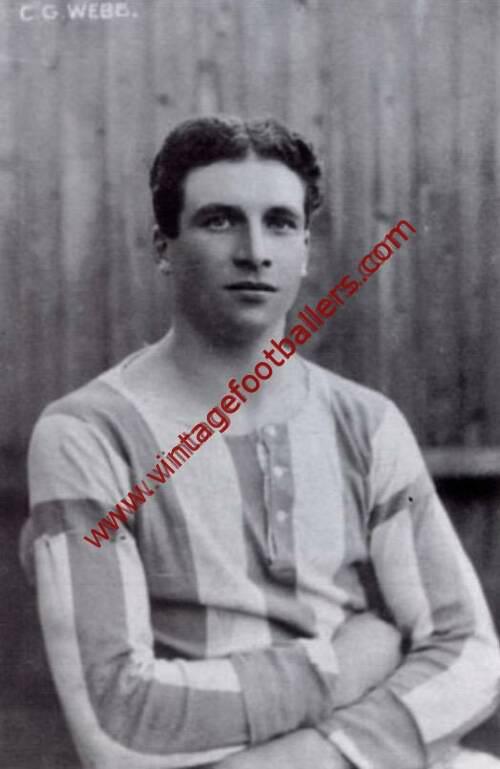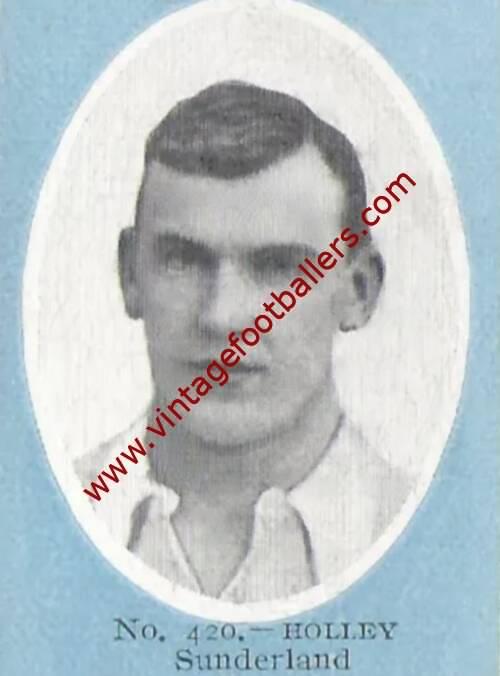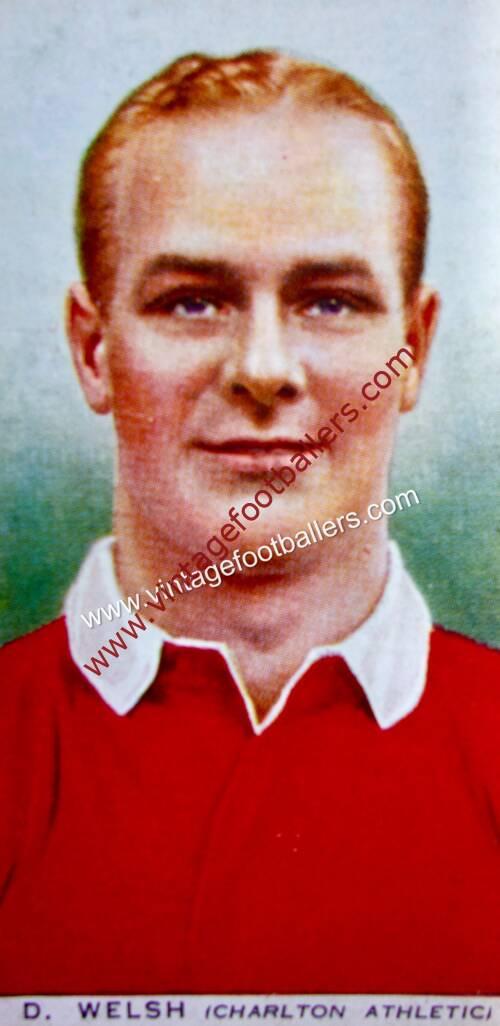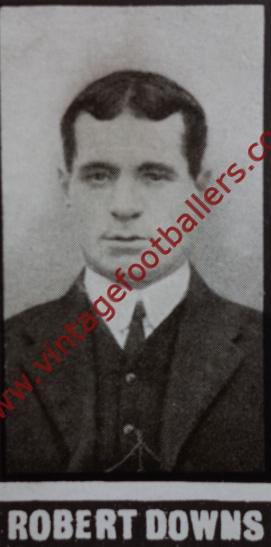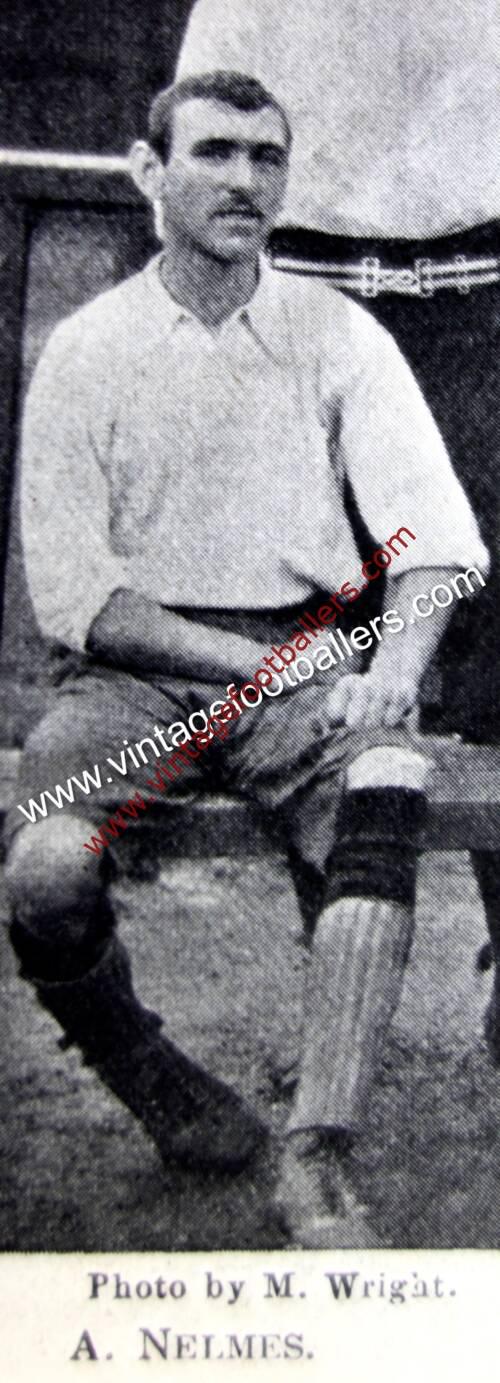Please choose your photo size from the drop down menu below.
If you wish your photo to be framed please select Yes.
Note: 16″x 20″not available in a frame.
Images can also be added to accessories. To order please follow these links
£8.95 – £49.95
Please choose your photo size from the drop down menu below.
If you wish your photo to be framed please select Yes.
Note: 16″x 20″not available in a frame.
Images can also be added to accessories. To order please follow these links
Curragh Camp, County Kildare, Ireland born inside left Charlie Webb is truly one of the greatest figures in the history of Brighton & Hove Albion. He was born into a Scottish military family began his football career as a 16-year-old, when he played first-team football for West Sussex League club Worthing, and in his second season, he contributed to Worthing winning a treble of the Sussex Senior Cup, the West Sussex Senior League, and a local charity cup. In 1904, Webb followed in the family tradition by enlisting in the 2nd Battalion of the Essex Regiment, and while serving in Ireland, he furthered his football career playing for his regimental team in the Leinster Senior League, and from 1907 he played in the Irish League for Bohemians. He scored freely for his regiment – in November 1907 he scored all seven in a 7-4 defeat of Dublin University – and early the following year was the only player from outside the Irish League to be selected for the Leinster representative team to play Ulster and later that year was chosen to represent The Irish League in a match against The Football League, when he played in a 6-3 defeat at Roker Park in October 1907.
He had a trial with Scottish club Rangers in 1908 and in November that year he was capped by the Ireland amateur national team, in a match against the England Amateurs at Dalymount Park, Dublin. Described by The Times’ reporter as “distinctly the best of an indifferent forward line”, he scored Ireland’s late consolation goal in a 5-1 defeat.
In January 1909, while on Christmas leave from his regiment, Webb played and scored for Brighton & Hove Albion in a Southern League match against West Ham United. On his return, the Army discovered he had appeared alongside professionals and banned him from military football for 12 months. The Football Association fined the Brighton club £5 “for having approached and played Webb in violation of the Rules of the Association.” Rumours that the military authorities would prevent him playing for Bohemians in the semi-final of the Irish Cup proved unfounded, but when Webb finished on the winning side, the Irish Times reported that Glentoran, the losing club, intended to protest his inclusion, on the grounds that playing in the Southern League made him ineligible to appear in the Irish Cup competition. The result stood, though by the time the Final was played, Webb had left the club. Forced to choose between his military and his football career, he bought himself out of the Army and signed for Brighton & Hove Albion as an amateur.
A few days later, Webb became the first Brighton player to be capped at full international level when he made his debut for Ireland in a 5-0 defeat against Scotland at Ibrox Park on 15th March 1909. In his second international match, a week later against Wales at Grosvenor Park, Belfast, Ireland lost 3-2, and Webb had to play the second half out of position at left half because of an injury sustained by English McConnell. Called up after Aberdeen’s Charlie O’Hagan withdrew from the party selected to play England in 1910, Webb was unable to accept the invitation. His third and final cap came the following March against Scotland, as replacement for James Macauley; given “one rare chance to open the scoring … with no one to beat but the goalkeeper”, he shot wide faced with an open goal as Scotland went on to win 2-0 at Celtic Park, Glasgow.
Webb proved a reliable goalscorer from inside left for Brighton, and in the 1909-10 season he scored nine times as the Seagulls won the Southern League title for the only time and in the FA Charity Shield he scored the winner against Football League Champions Aston Villa – the only time a Southern League team won the Shield. At the end of the 1909-10 season, the Times reported that “Brighton and Hove Albion have not had much difficulty in finishing at the head of the Southern League”. Webb played in every game as Albion won their first and, as of 2020, only major League title.
This achievement earned them a place in the FA Charity Shield in which they faced reigning Football League champions Aston Villa at Stamford Bridge in London on 5th September 1910. The only goal of the game was scored in the second half, following a corner kick taken by Albion’s Bert Longstaff. Aston Villa’s goalkeeper parried the ball into a knot of players, from where Bill Hastings touched it to Webb, “who cleverly evaded a couple of Villa defenders and found the net with a rising cross-shot.” Crowds packed the area around Brighton railway station to welcome the victors home at 11:30 pm, and the Sussex Daily News suggested that the team could “now be dubbed as Champions of England”. A testimonial fund raised more than £120 which was distributed among the professional players. As an amateur, Webb could receive no prize money, so the club presented him with a gold tie-pin instead. He turned professional soon afterwards.
He finished as the club’s leading scorer in 1912-13, with 13 goals in all competitions, and went on to set a club record for goals scored in the Southern League of 64. Though his Ireland career was at an end, Webb continued to be selected in representative teams. In September 1912, he scored for The Southern League as the Football League XI beat them 2-1 at Old Trafford, Manchester, and the following season, he was selected for a Southern Alliance eleven to play that League’s champions, Croydon Common; among his teammates was Patsy Hendren, the England Test cricketer. However a serious leg injury sustained in a match against Millwall in November 1914 effectively put an end to his playing career, not helped by the onset of the First World War. By that time Webb had scored 68 goals in 232 League, Cup and Charity Shield appearances for Brighton, and 79 goals in 275 matches in all competitions.
On the outbreak of War, Brighton & Hove Albion supported the War effort by having a rifle range built at The Goldstone Ground. Webb led rifle drill on the pitch, using wooden replicas where there were insufficient actual weapons to go round. He re-enlisted as a Second Lieutenant in The King’s Royal Rifle Corps, and served on the Western Front from July 1917. Promoted to Acting Captain (the rank was confirmed after the War), he was leading a patrol near Nesle in March 1918 when they were challenged in French. Unfortunately for Webb and his men, the French speakers were German troops. Preferring to avoid unnecessary injury or death, Webb surrendered. He saw out the duration as a Prisoner of War in Mainz, Germany. While awaiting repatriation, he received a letter from the chairman of Brighton & Hove Albion offering him the post of team manager, an appointment he took up on his demobilisation in 1919.
The club had closed down during the War, so Webb’s first task was not only rebuilding the team but also involving himself with rebuilding the ground. Competition resumed in 1919-20, Brighton’s final season in the Southern League, and the following season Webb led the team into the Football League as a Third Division was formed largely comprising the Southern League First Division teams of the year before. Awarded a testimonial in recognition of his service to the club, Webb chose the League game against Watford in April 1921 as his benefit match; it attracted more than 10,000 spectators and raised nearly £500. In the 1923-24 FA Cup, Webb led Albion to the Fifth Round (last 16), defeating First Division Everton on the way in what he later described as “the best Cup exhibition of any Albion team under my management”.
He earned a reputation as a sound judge of a player. Immediately after the War, the signing of former England international forward George Holley for a club record £200 fee was viewed as quite a coup. Holley suffered a career-ending injury, so hardly played, but Webb replaced him with Jack Doran who finished as the club’s top scorer despite joining halfway through the season. He brought Tommy Cook through from the juniors into the first team; Cook was top scorer in three seasons, but when he left the club to concentrate on his cricket career, Webb brought in the Queens Park Rangers reserve Hugh Vallance, who turned out to be a “goalscoring phenomenon” alongside Dan Kirkwood. Again, when twice top scorer Arthur Attwood succumbed to appendicitis in 1933, Webb signed former Norwich City centre-forward Oliver “Buster” Brown who had failed to break into the first team at West Ham United; with regular football at Albion, Brown produced 41 goals in his first two seasons.
Between the wars, Webb’s teams finished in the top five of the Third Division (South) on ten occasions, but challenged seriously for promotion only in the latter half of the 1930’s. He led the team to third place in 1936-37, despite an uneasy relationship with the club’s board, the supporters, and the press. The board came under criticism for alleged interference in team affairs, having undue influence over the manager in pressing the claims for selection of one player over another. Letters to the local press suggested that Webb should “be allowed greater freedom”, while in the Evening Argus, the pseudonymous “Crusader”‘s “vitriolic attacks on the directors and management of Brighton and Hove Albion for their alleged lack of ambition and inept team selections … generated a massive readership response” and led to “near physical confrontations with Charlie Webb, the beleaguered manager and former Albion player, despite the team usually finishing in a respectable position in the League table.” The club’s relationship with the local newspaper worsened during the 1937-38 season, to the extent that “Crusader” was “either banned by the directors or was voluntarily taken off by [the editor]”. Webb himself told the Daily Express: “Here you have a town full of people with money, yet hardly one of them will give us a hand. Without attractive new players and a winning team you can’t get gates and without gates you can’t have money.”
Nevertheless, the national press recognised his achievements. A Daily Mirror feature in 1939 compared him to George Allison of Arsenal and Major Frank Buckley of Wolverhampton Wanderers:
“but where some think and act in thousands of pounds, Charles is compelled to do the same in pence, and the consistently good football of Brighton is a tribute in itself … His great knowledge of the game has saved his club money in the way of transfer fees, and the reserve team is composed entirely of players found by him, costing not a penny. Even the first team cost very little, the highest fee paid being £50, and yet Brighton have been keen fighters for promotion for the past three seasons.”
A Guardian retrospective on the club, written in 1973, described how “Brighton had a skilful team usually playing to the top six” under Webb, “whose transfer acquisitions were as often as not costed on the price of his train ticket and buffet sandwiches”.
No longer of an age for active service, Webb joined the Home Guard during the Second World War. Brighton & Hove Albion continued to compete in the various wartime leagues, and Webb skilfully exploited the regulations allowing players to make guest appearances for the club nearest to their base. He was particularly fortunate that the King’s Liverpool Regiment’s posting to Newhaven in 1941 gave him the pick of Liverpool’s pre-war team. In their absence, he was reduced to selecting youngsters or soliciting members of the crowd to make up the numbers, as at Norwich City at Christmas 1940, when his travelling party of one senior player and three amateurs was supplemented by Jimmy Ithell of Bolton Wanderers, Norwich City juniors and local servicemen; Albion lost 18-0.
At the end of the 1946-47 season, at the age of 60, Webb handed over responsibility for team affairs to former player Tommy Cook, remaining with the club on the administrative side, as secretary and general manager. A few days after a 4-0 home defeat to Walsall left Albion at the bottom of the table, provoking a demonstration after the match, the directors appointed Don Welsh as secretary-manager. Webb stayed on until the end of the 1947-48 season to assist his successor, then left the club and retired from football. Such was Webb’s standing in the game that he was awarded a second testimonial. In September 1949, Portsmouth, reigning League Champions, though unable to field a full first team because “[their] dressing-room [was] like a hospital”, beat Arsenal, their predecessors as Champions, by two goals to one in “an exhibition of memorable football” at the Goldstone Ground. After his retirement, he wrote a regular column in the Sussex Daily News.
Webb’s stewardship as Brighton’s manager lasted 28 years in charge remains a club record and spanned 1,200 games and the club’s election to the Football League as founder members of the Third Division in 1920. He famously produced a number of steady sides on a shoestring budget and worked tirelessly for the club, selling tickets for cup ties from his house and storing the gate money in his larder over the weekend while waiting for the bank to open!
Webb is still fondly remembered in his adopted town. In 2003 a bus was named after him and that same year a plaque was unveiled in his honour at his long-time home on Frith Road. His daughter, Joyce, born on the same day as the 1910 FA Charity Shield match, spoke on screen at Brighton’s centenary evening, at which her father was one of 24 former players and managers nominated as “Legends” and profiled in the commemorative volume. According to Jess Willard, one of Webb’s post-Second World War signings, “everybody called him Mr Webb because he was a perfect gentleman”. A 1929 feature on the club in the Sussex County Magazine spoke of him as “one of the most dominating personalities associated with the club”, discharging his managerial duties “with such conspicuous success” while remaining “genial and popular with directors, players and public alike”.
| Weight | N/A |
|---|
